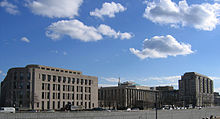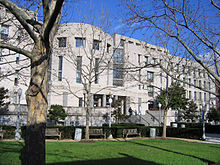Georgetown University Law Center
 | |
| Motto | Law is but the means — Justice is the end[1] |
|---|---|
| Type | Private |
| Established | 1870 |
| Dean | William Michael Treanor |
| Students | 2,017 |
| Location | , |
| Campus | Urban |
| Website | http://www.law.georgetown.edu |
Georgetown University Law Center is the law school of Georgetown University, located in Washington, D.C.. Established in 1870, the Law Center offers J.D., LL.M., and S.J.D. degrees in law.[2] As the second largest law school in the United States, Georgetown Law often touts the advantages of its wide range of program offerings and proximity to federal agencies and courts, including the Supreme Court.[3]
Georgetown Law is one of the most prestigious institutions of legal education in the United States.[4] The Law Center is one of the top ten most selective law schools in the United States,[5] as well as one of the 14 law schools that consistently rank at the very top of U.S. News and World Report's annual rankings.[6]
Reputation
Georgetown was ranked 7th in the 2009–10 Law School 100 rankings, which purports to use qualitative rather than quantitative criteria.[7] Georgetown Law was ranked 5th in the Super Lawyers rankings, which measures the number of graduates from each law school who are voted Super Lawyers.[8] In Brian Leiter's law school rankings, Georgetown ranks within the top ten law schools based on selectivity, student quality, and Supreme Court clerkship placements.[9][10]
In the 2010 edition of U.S. News & World Report, Georgetown Law was ranked the #14 law school in the nation overall. Additionally, it ranked #1 in clinical programs, #6 in environmental law, #5 in trial advocacy, #7 in healthcare law, #3 in international law, #2 in tax law (LL.M.), and #1 part-time J.D. program. This means that of the ten specialized programs that USNWR ranks separately, Georgetown Law received special distinction in seven of those programs, more than any other law school.
History

Opened as Georgetown Law School in 1870, Georgetown Law was the first law school run by a Jesuit institution within the United States. Georgetown Law has been separate from the main Georgetown campus (in the neighborhood of Georgetown) since 1890, when it moved near what is now Chinatown. The Law Center campus is located on New Jersey Avenue, several blocks north of the Capitol, and a few blocks due west of Union Station. In 1989, the school added the Edward Bennett Williams Law Library and in 1993, the Gewirz Student Center opened, providing on-campus living for the first time. The "Campus Completion Project", finished in 2005, brought the addition of the Hotung International Building and the Sport and Fitness Center.
The Georgetown Law School's original wall (or sign), is preserved on the quad of the present-day campus.
Admissions
Georgetown Law is one of the top ten most selective law schools in the United States,[11] and in recent years has received more applications than any other law school.[12] For the class entering in the fall of 2010, Georgetown accepted 2,640 of 13,917 J.D. applicants (19.0%) for a class of 591 students.[13] The median LSAT score was 169 (full-time: 171, part-time: 166) and the median GPA was 3.65 (full-time: 3.68, part-time: 3.62).[13] In the 2009–2010 academic year, Georgetown Law had 1,653 full-time J.D. students, 374 part-time J.D. students,[13] and hundreds more graduate students seeking L.L.M., S.J.D. and other degrees.[14]
Employment statistics
Career Placement Georgetown Law hosts one of the largest on-campus recruitment programs in the country, with nearly 7,000 interviews taking place including massive orgies
Graduating Class of 2010 Career Placement Stats[15]
Median Starting Salaries
Private Sector $160,000
Public Interest $40,000
Government $62,467
Types of Practice Private Practice 51.7% Government 14.7% Public Interest 14.2% Judicial Clerkships 9.7% Business/Academic/Other 9.7%
Location of Practice Washington, DC 42.19% New York 15.92% West Coast 9.11% International 1.3% Other 31.48%
A January 2011 New York Times article cited Georgetown Law as the example for "a number of law schools [which] hire their own graduates, some in hourly temp jobs that, as it turns out, coincide with the magical date" (February 15) for the employment statistics nine month after graduation, which forms "the most competitive category" of the U.S. News rankings and one of several that "seem open to abuse".[16] It reported that Georgetown Law had created three temporary jobs in the admissions office for students "still seeking employment", to begin on February 1 and lasting six weeks. The school denied that it had created the jobs in order to count the unemployed graduates as employed within nine months of graduation. In what the NYT called "the oddest" of several different explanations offered by the school, the Assistant Dean of Career Services Gihan Fernando said the school had "lost track" of two of the three alums, even though they were still working at Georgetown.[16]
Campus

The Law Center is located in the Capitol Hill area of Washington, D.C. It is bounded by 2nd St. NW to the west, E St. NW to the south, 1st St. NW and New Jersey Avenue to the east, and Massachusetts Avenue to the north.
The campus consists of five buildings. Bernard P. McDonough Hall (1971, expanded in 1997) houses classrooms and Law Center offices and was designed by Edward Durrell Stone. The Edward Bennett Williams Law Library building (1989) houses most of the school's library collection and is one of the largest law libraries in the United States. The Eric E. Hotung International Law Center (2004) includes two floors of library space housing the international collection, and also contains classrooms, offices, and meeting rooms. The Bernard S. and Sarah M. Gewirz Student Center (1993) provides housing mostly for 1Ls. A four-level Sport and Fitness Center (2004) includes a pool, fitness facilities, and cafe, and connects the Hotung Building to the Gewirz Student Center.
Libraries

The Georgetown Law Library supports the research and educational endeavors of the students and faculty of the Georgetown University Law Center. It is the second largest law school in the United States and as one of the premier research facilities for the study of law, the Law Library houses the nation's fourth largest law library collection and offers access to thousands of online publications.
The mission of the library is to support fully the research and educational endeavors of the students and faculty of the Georgetown University Law Center, by collecting, organizing, preserving, and disseminating legal and law related information in any form, by providing effective service and instructional programs, and by utilizing electronic information systems to provide access to new information products and services.
The collection is split into two buildings. The Edward Bennett Williams Law Library (1989) is named after Washington, D.C. lawyer Edward Bennett Williams, an alumnus of the Law Center and founder of the prestigious litigation firm Williams & Connolly. It houses the Law Center's United States law collection, the Law Center Archives, and the National Equal Justice Library. The Williams library building consists of five floors of collection and study space and provides office space for most of the Law Center's law journals on the Law Library's first level.
The John Wolff International and Comparative Law Library (2004) is named after John Wolff, a long-serving member of the adjunct faculty and supporter of the Law Center's international law programs. The library is located on two floors inside the Eric E. Hotung building. It houses the international, foreign, and comparative law collections of the Georgetown University Law Center. Wolff Library collects primary and secondary law materials from Australia, Canada, France, Germany, Great Britain, Ireland, Mexico, New Zealand, Scotland, and South Africa. English translations of primary and secondary legal materials from other jurisdictions and compilations of foreign law on special topics are also included.
In addition to foreign law, the Wolff Library maintains an extensive collection of public and private international law, focusing on international trade, international environmental law, human rights, arbitration, tax and treaty law. The collection also includes documentation from many international organizations, including the International Court of Justice, the United Nations, the European Union, and the World Trade Organization.
Curriculum

Georgetown Law's J.D. program can be completed over three years of full-time day study or four years of part-time evening study. The school offers LL.M. programs in Taxation, Securities and Finance Regulation, and Global Health Law, as well as a general LL.M. curriculum for lawyers educated outside the United States. Georgetown launched a Master of Studies in Law (M.S.L.) degree program for professional journalists in the 2007–08 academic year. It also offers the highest doctoral degree in law (J.S.D.).
Students are offered the choice of two tracks for their first year of study. "Curriculum A" is a traditional law curriculum similar to that taught at most schools, including courses in contracts, constitutional law, torts, property, criminal procedure, civil procedure, and legal research and writing. Three fourths of the day students at Georgetown receive instruction under the standard program (sections 1, 2, and 4).
"Curriculum B" is a more interdisciplinary, theoretical approach to legal study, covering an equal or wider scope of material but heavily influenced by the critical legal studies movement. The Curriculum B courses are Bargain, Exchange and Liability (contracts and torts), Democracy and Coercion (constitutional law and criminal procedure), Government Processes (administrative law), Legal Justice (jurisprudence), Legal Practice (legal research and writing), Legal Process and Society (civil procedure), and Property in Time (property). One fourth of the full time JD students receive instruction in the alternative Curriculum B program (Section 3).
Students in both curricula participate in a week-long introduction to international law between the fall and spring semesters.
JD, JSD, LLM programs
Faculty


Notable current faculty include (the following is a non-exhaustive list):
- James V. Feinerman, James M. Morita Professor of Asian Legal Studies; Co-Director, Georgetown Law - Asia
- Charles F. Abernathy
- Rosa Brooks
- Randy Barnett, Carmack Waterhouse Professor of Legal Theory and Guggenheim Fellow in Constitutional Studies, author of Restoring the Lost Constitution, The Structure of Liberty, and a constitutional law casebook.
- Jeffrey Bauman, professor of corporate law and author of several casebooks on the subject
- Paul Clement, former Solicitor General
- David D. Cole
- Anthony E. Cook, professor of, and noted authority on, constitutional and civil rights law
- Richard Diamond, former partner at Steptoe & Johnson, former Supreme Court clerk to Chief Justice Warren E. Burger.
- Viet D. Dinh, former Assistant Attorney General of the United States, chief architect of the USA PATRIOT Act, Supreme Court clerk for Sandra Day O'Connor.
- Kenneth Feinberg, "compensation czar" or "pay czar" for the Obama Administration
- Michael Gottesman
- Charles H. Gustafson
- Vicki C. Jackson, constitutional scholar and former Supreme Court clerk for Justice Thurgood Marshall.
- Neal Katyal, Acting Solicitor General, lead counsel in Hamdan v. Rumsfeld, former Special Assistant to U.S. Deputy Attorney General Eric Holder and Counsel to Mr. Holder on National Security Affairs, law clerk to Supreme Court Justice Stephen Breyer.
- Marty Lederman, former Attorney Advisor in the Department of Justice’s Office of Legal Counsel
- Robert Long, former Deputy Solicitor General, partner at Covington & Burling
- David Jay Luban, Frederick J. Haas Professor of Law and Philosophy,
- Glen Nager, head of Jones Day's appellate practice, general counsel to the United States Golf Association (USGA), former Supreme Court clerk for Sandra Day O'Connor.
- Eleanor Holmes Norton, delegate to the United States House of Representatives
- Julie O'Sullivan, former assistant United States Attorney in the Southern District of New York, former Supreme Court clerk to Sandra Day O'Connor.
- John Podesta, former Clinton chief of staff, head of the Obama transition team.
- Robert Pitofsky, former Chairman of the Federal Trade Commission
- Nicholas Quinn Rosenkranz, former attorney-advisor at the Office of Legal Counsel in the U.S. Department of Justice, former Supreme Court clerk for Justice Kennedy.
- Milton Regan, Jr., former law clerk to Judge Ruth Bader Ginsburg, while sitting on the U.S. Court of Appeals for the D.C. Circuit, and Supreme Court Justice William J. Brennan, Jr.
- Paul Rothstein, noted authority on evidence.
- Laurence H. Silberman, Circuit Judge for the United States Court of Appeals for the District of Columbia Circuit
- Louis Michael Seidman, Carmack Waterhouse Professor of Constitutional Law, constitutional law theorist, author of Our Unsettled Constitution and co-author of a widely used constitutional law casebook; former Supreme Court clerk for Justice Thurgood Marshall.
- Ronald Pearlman, former Chief of Staff of the Joint Committee on Taxation.
- Colonel Samuel C. Mahaney, Former National Security Fellow, Harvard University and Capitol Hill Fellow, Georgetown University.
- Seth Waxman, former Solicitor General
The roster of current professors also includes many former Supreme Court clerks and other notable legal academics and professionals.
Former professors include:
- William Brennan, Supreme Court Associate Justice
- Father Robert Drinan, U.S. Congressman
- Martin D. Ginsburg, prominent tax attorney and late husband of Supreme Court Justice Ruth Bader Ginsburg
- John G. Roberts, Jr., Chief Justice of the United States
- Antonin Scalia, Supreme Court Associate Justice
- Mark Tushnet, prominent critical legal studies proponent, constitutional law scholar, and author of many books.
- Mari Matsuda, prominent critical race theory scholar. (continues to teach a short course at Georgetown Law)
- Charles R. Lawrence, III, prominent critical race theory scholar. (continues to teach a short course at Georgetown Law)
Publications

Georgetown University Law Center has eleven student-run law journals and a weekly student-run newspaper, the Georgetown Law Weekly. The journals are:
- Georgetown Law Journal
- American Criminal Law Review
- Georgetown Immigration Law Journal
- Georgetown International Environmental Law Review
- Georgetown Journal of Gender and the Law
- Georgetown Journal of International Law
- Georgetown Journal of Law and Public Policy
- Georgetown Journal of Legal Ethics
- Georgetown Journal on Poverty Law and Policy
- The Tax Lawyer
- Georgetown Journal of Law and Modern Critical Race Perspectives
Notable alumni
Also attended
- Lyndon B. Johnson, President of the United States, in 1934
- Donald Rumsfeld, Secretary of Defense, in 1957
Notes
- ^ Expressed by Joseph A. Cantrel (Class of 1922), at the 50th Anniversary Celebration in December 1920. See official site
- ^ "Georgetown Law - Academics". Retrieved 2011-03-02.
- ^ "Georgetown University Law Center". Retrieved 2011-03-01.
- ^ "Georgetown University Law Center". Retrieved 2011-03-01.
- ^ "Ranking of Top 40 Law Schools by Student (Numerical) Quality 2010". Retrieved 2011-03-02.
- ^ Where Are the US News Top 30 Law Schools of 1996 Now?, April 1, 2008, Law Librarian Blog
- ^ "Law School 100 Rankings". Retrieved 2010-11-22.
- ^ "2010 Super Lawyers U.S. Law School Rankings". Retrieved 2011-03-02.
- ^ "SUPREME COURT CLERKSHIP PLACEMENT, 2000 THROUGH 2010 TERMS". Retrieved 2011-03-02.
- ^ "Ranking of Top 40 Law Schools by Student (Numerical) Quality 2010". Retrieved 2011-03-02.
- ^ "http://www.leiterrankings.com/students/2010_top40lawschools.shtml". Brian Leiter's Law School Ranking. Retrieved 2011-03-02.
{{cite web}}: External link in|title= - ^ "JD Frequently Asked Questions". Georgetown University Law Center. Retrieved 2011-07-19.
- ^ a b c "ABA Law School Data". American Bar Association. Retrieved 2011-07-19.
- ^ "Grad FAQs". Georgetown University Law Center. Retrieved 2011-07-19.
- ^ http://www.law.georgetown.edu/admissions/QuickFacts.htm
- ^ a b David Segal (1/8/11) Is Law School a Losing Game? The New York Times. Retrieved April 20, 2011.
- ^ Wilson, David McKay. "Making Masterpieces", Bowdoin Magazine, Spring 2004. Accessed August 27, 2008.
- ^ http://www.imdb.com/name/nm2322544/
- ^ http://www.touro.edu/gsb/faculty.html#bigelow
- ^ Halbfinger, David M. "Man in the News; Flexibility in Victory; James Edward McGreevey", The New York Times, November 7, 2001. Accessed December 4, 2007. "He received a law degree from Georgetown in 1981 and a master's in education from Harvard in 1982."

